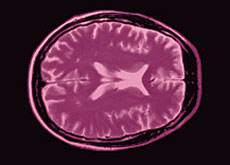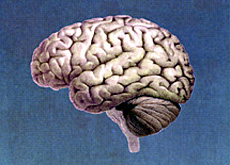Experts explore mysteries of the brain

Doctors and researchers from around the world are meeting in Geneva this week to explore the complexities of the human brain.
International Brain Week – now in its sixth year – offers a unique opportunity for specialists to discover more about the brain and how it functions.
A series of roundtable discussions, hosted by Geneva University, will allow experts to exchange information and research on a wide range of topics from Alzheimer’s disease to schizophrenia.
Two of this year’s debates will deal specifically with issues related to young people: cannabis consumption and Attention Deficit Hyperactivity Disorder (ADHD).
Cannabis
A study conducted in 2000 by the Swiss Institute for the Prevention of Alcohol and Substance Abuse (ISPA) revealed that 25 per cent of people in Switzerland between the ages of 15 and 25 occasionally smoked cannabis.
Out of that group, the research showed that around 50,000 smoked at least once per day.
Brain Week participant and psychiatrist, Marina Croquette-Krokar, finds these statistics alarming.
“Young people are consuming more and more cannabis… they’re no longer satisfied with a joint or two every once in a while and they’re increasingly using it during the day,” she told swissinfo.
According to Croquette-Krokar, regular consumption can have a serious impact on the mental and physical well being of young people.
“The most worrying long-term effects of cannabis use are links to mental disease, such as schizophrenia, as well as physical disease, such as lung cancer.”
Political debate
In Switzerland, cannabis consumption has become a highly politicised issue.
In December 2001, the Senate came out in favour of a change in Swiss law that would decriminalise cannabis use. The House of Representatives is expected to vote on the controversial move later this year.
Opponents of liberalisation, especially teacher and parent groups, have stepped up pressure on parliamentarians to prevent the change from going through.
Croquette-Krokar is among those who believe there is sufficient medical evidence to suggest that cannabis consumption should remain a criminal offence in Switzerland.
“The people who defend the decriminalisation of cannabis believe it’s a public health problem… which is correct,” she said. “Our aim is to focus on the medical issues and impact of cannabis consumption… in the hope that the politicians will base their decision on the medical facts.”
Hyperactivity
Another youth-related topic under discussion in Geneva this week is Attention Deficit Hyperactivity Disorder (ADHD).
It is estimated that three to five per cent of all children suffer from some form of ADHD, which is manifested by an inability to concentrate or stay still for a given period of time.
It is known that the number of boys who suffer from the disorder is three times higher than the number of girls.
Researchers have also discovered that ADHD is genetically linked and is most often passed down from father to son.
According to Charles-Antoine Haenggeli, the head of neuro-paediatrics at Geneva University Hospital, the challenge is now to identify which genes are specifically responsible for causing ADHD.
“We still don’t know exactly what goes wrong… we know there’s definitely a genetic component to it and that it clusters in families,” he told swissinfo.
“Now we need to determine which genes are involved and make a link between the clinical symptoms we see… such as learning disabilities or tic disorders,” he added. “Then we need to come up with a treatment that deals with each child’s metabolic problems.”
Treatment
Haenggeli hopes the Brain Week discussions will allow experts to gain better insight into how ADHD is passed on from generation to generation, helping them to come up with even more effective forms of treatment.
For decades, doctors have prescribed the stimulant known as Ritalin to treat the symptoms of ADHD, although there has been some concern over the long-term effects of its use.
According to Haenggeli, extensive research has shown that Ritalin is both safe and effective but he is adamant that medication is not the cure.
“We need to take care of these children in school and at home with different forms of treatment… from speech therapy to psychotherapy and the medication should be used to supplement these efforts,” he said.
swissinfo, Anna Nelson in Geneva
The sixth annual International Brain Week, hosted by Geneva University, brings together experts from around the world to exchange the latest research into the workings of the human brain.
The event, which runs until March 15th, will explore a variety of topics from Alzheimer’s disease to Schizophrenia and from cannabis consumption to Attention Deficit Hyperactivity Disorder.
Roundtable discussions, led by Swiss specialists, are taking place throughout the week. The debates will be open to the public on March 15th.

In compliance with the JTI standards
More: SWI swissinfo.ch certified by the Journalism Trust Initiative












You can find an overview of ongoing debates with our journalists here . Please join us!
If you want to start a conversation about a topic raised in this article or want to report factual errors, email us at english@swissinfo.ch.